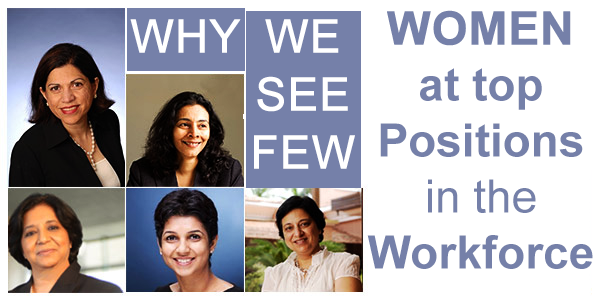This is a highly relevant question, especially in a country like India. Here, most women have grown progressive in their outlook, with regard to their own autonomy and value, and when it comes to their gender and feminism in general. But sadly, society at large hasn’t modified its mentality, still.

So, why don’t we see many women at the top in companies and corporations?
Well, reaching the top, in any field, whether corporate, academics, journalism, science, the arts, law or commercial ventures requires time, commitment, resourcefulness, tenacity and hard work.
Women can, of course, put in all of these and rise to the top, same as men. But there are two major factors hampering their progress and ambitions: misogyny and patriarchy. All the reasons responsible for stopping more women from getting to the top in their professions stem from these two factors. Let me discuss that in a little more detail.
Safety
Often, professions need putting in long hours at work, which means working late into the night. Women find it difficult to commute safely from home to work and back, especially at night. If, during the day time, they meet groping, lewd stares and comments from male commuters and roadside lechers; at night they face grave bodily harm – molestation and rape. There have recently incidents of such crimes from cab drivers and local trains, even in metro cities like Delhi and Mumbai, especially with women returning home alone at night. This, of course, stops young women from accepting jobs which need them to work late; quite often, they get stopped by their families from working late for the same reason. This ensures that they stay stuck in lower positions in their professions.
Hiring problems
A still-prevailing sexist attitude towards women ensures that they find it tougher to get recruited in competitive professions. Also, as I mentioned in my article on maternity leave rules, companies are reluctant to hire women who are planning a family in the near future. They are afraid to invest in paid leave facilities for their women employees who are nursing newborns.
Discrimination at the workplace
Women are, often, routinely passed over for promotion. As already mentioned, the problem is worse with working mothers, who get harassed and given less important assignments. A woman has to put in more effort, and longer working hours, than her male counterpart, to meet the same level of professional success. Due to these problems, many women resign from their jobs before they can get a chance to reach the apex in their career. Even due to lack of daycare facilities for their children, they have to risk losing their jobs to take care of the kids.
Marriage
A misogynist mentality ensures that most women get seen only as objects, married off when they reach a certain age, and to produce babies and keep the house in order. Many young women, with ambitions, dreams, talent and even high qualifications, get stopped from working by parents and suitors who are, mentally, still stuck in the age of dinosaurs. Also, a man is still seen as the bread-winner of the house. Women are supposed to take care of the babies and cook and clean, and stay confined within the four walls of the household. Many women can’t work, or have to resign, because they get forced into marriage and motherhood.
Lack of familial support
It’s always women who are expected to make a hard choice between work and family. They have to run the house, manage the finances, watch the kids and manage work demands. Their husbands and extended families, more often than not, do not share the burden of chores at home. Working women have to get up early in the morning, and make breakfast for everyone, and get the kids ready for school. Then, at night, even if both spouses come home equally exhausted, it’s the wife who has to get dinner ready, while the husband relaxes and watches TV. Often, unable to take the strain, women have to give up on pursuing their careers.
Societal attitude
The sexist mentality, as mentioned earlier, sees women as people who have to be meek, docile and always willing to serve their husband and family. Women who are tough, assertive, better qualified and more intelligent and ambitious than their male counterparts get seen as ‘bad’ women. They get judged and questions get raised on their character, if they chose to pursue a full time career than start a family and tend to their home. Independent, single women, who earn well and live their life the way they want, get judged even more harshly. This prevents many women from going after professional success. Plus, many professions are still seen as a male bastion. Women working these professions face many difficulties before they can realize their goals and make a name and niche for themselves.
Despite these problems, there are still powerful women like Kiran Majumdar-Shaw, the founder of Biocon, a multi-billion company, banker Chanda Kochar, Sudha Murthy, super cop Kiran Bedi and other such achievers.
These women overcame all obstacles to reach where they are today. More women need to be courageous and ambitious to rise to the top in their careers. Unless they work hard to better their own positions and assert their rights , they will not receive the support they deserve from family, society and employers.






























